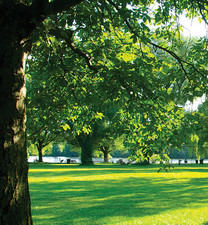No. 14: Bermuda grass that tolerates shade

We think of Bermuda grass as the front lawn of choice for southern homeowners, but it’s so much more.
It’s the go-to grass in parks. Farmers grow it for their grazing livestock. Managers of golf courses and sports arenas plant it for its extraordinary durability, even in extreme heat.
Bermuda grass does have a downside, however: It has to soak up eight to 10 hours of sunshine a day in order to thrive. At least that was the case before scientists at The University of Georgia rolled out something once considered unthinkable: Bermuda grass that tolerates shade.
Marketed as TifGrand®, the grass requires only half the amount of sunlight as other Bermuda options. It needs less water and fertilizer and is more resistant to pests. It’s even kind to people who are sensitive to allergies, because the cultivar is seed and pollen sterile.
Wayne Hanna in UGA’s College of Agricultural and Environmental Sciences started working on the grass back in 1991 and was later joined by Kris Braman. Together, they painstakingly grew and culled hundreds of hybrids until they landed on one that tested consistently well in 19 states.
TifGrand was introduced to the marketplace in 2009 as a group of four grasses, each optimized for a specific need. No longer must landscapers choose between lovely shade trees and lush Bermuda sod – thanks to UGA, they can have both.
